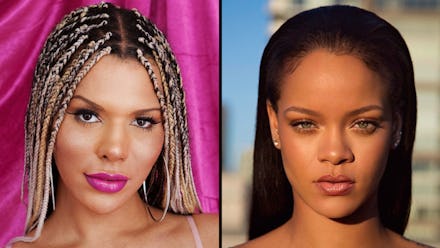Inclusive beauty brands have the chance to lead by example, starting with Munroe Bergdorf

Let’s start by playing catch-up: On Aug. 28, DJ, activist and model Munroe Bergdorf made history as the first out trans woman to land her own L’Oréal U.K. campaign. On Sept. 1, L’Oréal U.K. fired Bergdorf after anti-racist comments she made in the aftermath of the Unite the Right rally in Charlottesville, Virginia surfaced and the company deemed her remarks “at odds with [their] values.” Days later, fellow L’Oréal spokesmodel Clara Amfo asked to be removed from the campaign in a show of solidarity and was soon joined by others within the industry using the hashtag #IStandWithMunroe.
L’Oréal’s choice to drop Bergdorf only contributes to a troubling precedence in which people of color are made to feel as though they can only speak out against racism if their truth remains inoffensive to white people.
For brands like Fenty Beauty, ASOS, Milk and MAC, who have cornered the market on inclusive messaging, L’Oréal’s oversight is an opportunity to truly stand by their values. In short, they should get on board and support Bergdorf in a big way by casting her in their next campaigns. And, if social media is any temperature checker, they stand to gain even more brand value if they do.
With the pointed tagline “beauty for all,” Rihanna consciously founded Fenty Beauty with the intention of making cosmetics feel more accessible. Her flagship campaign featured women of all skin tones, shapes and body types: Duckie Thot, Paloma Elsesser and Slick Woods were just a few of the familiar faces.
Despite having little formal education in the beauty sector, Rihanna not only managed to sell out the majority of the collection the week it debuted, but ran out of its deepest foundation tones first. That’s a pretty clear indicator the brand is not only addressing a market gap, but also proving to other major beauty players that diversity can (and will) carry the day.
If Fenty Beauty or any of the above brands welcomed Munroe Bergdorf into the fold now, it would be more than a symbolic gesture. Doing so would send a message to L’Oréal and similar brands that silencing minority opinions to potentially protect your bottom line is an archaic way of thinking that isn’t supported by the public or its competitor brands.
Fenty Beauty has already proven to be incredibly impactful (just look at the turn-out to the NYC launch earlier this week), largely because they understand that marketing to youth involves embracing the issues they care about. Leveraging that knowledge to actually force visibility for under-represented people and issues activates a new kind of corporate responsibility in older, legacy brands.
Even while we’ve seen completely disastrous attempts to cash in on the generational interest in social activism — Pepsi’s Kendall Jenner mishap will not soon be forgotten — we’ve also seen narrative-changing marketing schemes that have benefited both corporations and individuals. Acne Studios’ fall campaign, which featured dads Kordale Lewis and Kaleb Anthony alongside their children, is one example.
Other examples are Ivy Park’s inclusion of Laverne Cox in its latest campaign, Nike tapping Leiomy Maldonado for its #BeTrue ad and Asics casting trans model Kayla Ward for its “I Move Me” campaign. Cox in particular has been outspoken about the difficulty trans women have in the entertainment and fashion industries — they’re often typecast, viewed as a novelty or simply told they’re not a fit for model castings or television and film roles.
Brands like these can and should challenge problematic standards about who brand ambassadors should be and what issues they are allowed to speak out on. In doing so, they will ultimately be on the right side of progress.
RiRi, we know you’re busy maintaining that empire, but if you get a chance, take a look at Munroe Bergdorf and consider casting her in your next campaign.